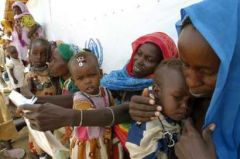Darfur conditions said worse, talks resume
By Nima Elbagir
KHARTOUM, Aug 31 (Reuters) – Conditions are worsening for refugees in Darfur, U.N. agencies said on Tuesday, as the Sudanese government and rebels struggled to make headway in talks aiming to ease the conflict in the Darfur region.
 The U.N. agencies said the Darfuri refugees were facing violent attacks and spreading disease, while heavy rains were wreaking havoc with aid convoys.
The U.N. agencies said the Darfuri refugees were facing violent attacks and spreading disease, while heavy rains were wreaking havoc with aid convoys.
The reports came a day after the expiry of a deadline set by the U.N. Security Council for Sudan to prove it can protect the refugees in Darfur or face possible sanctions.
“The humanitarian situation in Darfur continues to worsen, with ongoing violations and the rainy season at its peak which is hampering and disrupting the flow of international aid very often,” Simon Pluess, spokesman for the U.N. World Food Programme (WFP), told a news briefing in Geneva.
The World Health Organisation also reported on Tuesday a near doubling in hepatitis cases in Darfur in the past month due to insufficient clean water and poor sanitary conditions.
The United Nations estimates up to 50,000 have died since the conflict began in February 2003. More than a million have fled their homes for fear of attack by Arab militia, known as Janjaweed, who rebels say are supported by the government.
Khartoum admits arming some militias to fight the uprising, but denies any links with the Janjaweed, saying they are outlaws.
The Sudanese government and rebel groups have been holding peace talks for more than a week now seeking to find ways to ease the plight of refugees in Darfur, in western Sudan.
The talks, in the Nigerian capital Abuja, have been bogged down by accusations of ceasefire violations on both sides.
On Tuesday, delegates to the talks said the two sides were still at the stage of trying to hammer out a basic starting point for discussions, by narrowing their differences on quite how bad the situation was in Darfur.
AID WORKERS KIDNAPPED
Underlining the problems in Darfur, Sudanese officials said on Tuesday that rebels had kidnapped 22 volunteers who had joined a programme to vaccinate people affected by the fighting.
The head of Sudan’s vaccination programme and emergency operations office, Hassan Idriss, said rebels from the Justice and Equality Movement (JEM) abducted the volunteers on Sunday.
JEM officials were not immediately available to comment.
The U.N. Security Council is due to receive a report on Darfur from U.N. special envoy Jan Pronk, who is scheduled to address the 15-member body on Thursday.
It was unclear however whether there would be enough votes in the Security Council to impose sanctions on Sudan, even if Pronk’s report were to prove Khartoum had failed to do enough to protect the refugees.
Nor has the U.N. specified what sanctions it could take on Sudan, a relatively small oil producer exporting about 200,000 barrels a day from its fields in the south of country.
Unilateral U.S. sanctions already bar American companies investing in Sudan’s oil sector.
Pressure from human rights groups saw commercial companies Talisman of Canada and Austria’s OMV sell their stakes. Foreign concessions now are limited to Indian state Oil and Natural Gas Corp (ONGC), Malaysian state Petronas and China National Petroleum Corp and small Swedish concern Lundin Petroleum.
